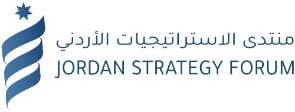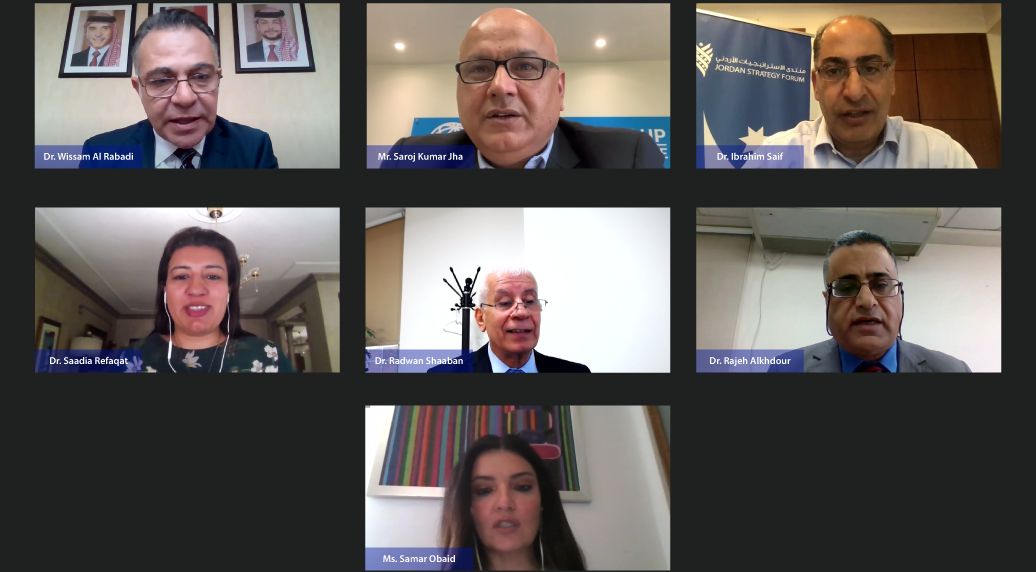JSF Hosts the World Bank Launching Event of The Jordan Economic Monitor (JEM) Spring 2020 edition
14-07-2020
JSF Hosts the World Bank Launching Event of The Jordan Economic Monitor (JEM) Spring 2020 edition Amman, July 14, 2020 — The World Bank launched today its Jordan Economic Monitor (JEM) Spring 2020 edition “Weathering the Storm” in a virtual meeting hosted by the Jordan Strategy Forum and in collaboration with the Ministry of Planning and International Cooperation. The JEM discusses the recent economic developments and highlights some of the key macroeconomic policy challenges facing the Kingdom, mainly as a result of the COVID-19 pandemic that has severely affected the lives and livelihoods of Jordanian citizens. The event included a panel discussion with World Bank experts, the Jordanian minister of planning and international cooperation the JSF CEO, Dr. Ibrahim saif and it was moderated By EY partner Mrs Samar Obaid. The COVID-19 pandemic poses a severe economic and social shock on all countries alike, and Jordan is no exception. Yet the impact on Jordan’s economy is further amplified as the country was already moving along a low growth trajectory amid high youth and women unemployment rates. The pandemic is likely to lead to a deep global recession that could potentially be protracted, in part due to the lingering health risks. According to the report, the Jordanian economy is projected to contract by 3.5% in 2020. This compares to a forecasted contraction of 4.2 percent for the MNA Region and a contraction of 5.2 percent for the World economy according to the World Bank’s June 2020 Global Economic Prospects. This negative impact is expected due to various channels, in particular trade, remittances, tourism, as well as the service sector. There are major downside risks to this projection as some countries have difficulties getting the first wave of the pandemic under control while others could face a second wave. Given the services-oriented nature of its economy, Jordan is expected to gradually recover while still remaining below its long-term trend. “The recent global and domestic disruptions due to the COVID-19 pandemic are severely impacting the Jordanian economy and its prospects,” said Saroj Kumar Jha, World Bank Mashreq Regional Director. “The World Bank is committed to support Jordan take swift measures to protect the poor and the vulnerable, maintain the provision of essential services, buffer economic activity, and preserve human capital investments.” The response to this crisis requires a substantial mobilization of resources. Given deteriorating global liquidity conditions, additional financing needs arising from the COVID-19 crisis will likely be high and persist over the medium term, and hence further heighten Jordan’s dependence on official flows. “Over the medium-term reviving growth and job creation—which is key to long-term sustained reduction in poverty and vulnerability—will depend on the pace of global recovery and the economy’s own resilience,” said Saadia Refaqat, World Bank Senior Economist and author of the report. Over the past few years, Jordan has laid the foundation for a more sustainable and inclusive growth through it’s Five-Year Reform Matrix to set Jordan on a growth path, focusing on creating jobs, especially for youth and women. The Government, with support from the World Bank, has already made important progress with the implementation of key reforms in the area of labor market, social safety nets, private sector competitiveness and governance. Faced with new challenges from the COVID-19 shock, steadfast focus on key structural reforms in agriculture, tourism, trade facilitation, support to SMEs, digital transformation as well as improving the business environment and access to finance can help Jordan accelerate its recovery and further strengthen resilience. “At the outset of COVID-19 outbreak, Jordan moved rapidly to mitigate and contain the spread of the virus, undertaking strict measures and prioritizing the health and lives of its citizens.” said Wissam Rabadi, Minister of Planning and International Cooperation. “Our response strategy resulted in recording a relatively low number of cases and mortalities, and accordingly enabled the economy, within a short period of time, to fully reopen domestically. The challenge ahead of the world, including Jordan, is to recover from this shock as quickly and efficiently as possible towards a more sustainable and inclusive economy.” Dr. Ibrahim Saif, the Chief Executive Officer of the Jordan Strategy Forum, brought to light from his side that the report discussed important issues concerning the economy performance during the first quarter of this year and sources of growth and potential prospects, Saif said the indicators mentioned in the report showed stability and ”modest” growth. However, during the second quarter, these developments have been disrupted by the COVID-19 pandemic and the resulting consequences, therefore, it has become difficult to maintain this dynamic in growth both domestically and in foreign export markets. Saif emphasized that the regional developments were reflected on the local market in terms of workers' remittances or absorbing part of Jordanian labor and the volume of Jordanian exports to the regional partners. Saif also mentioned that there is a gap between job opportunities created and skills. Saif also mentioned that the low economic participation of women in Jordan despite the high level of education of females is caused by a number of reasons related to the absence of a conducive environment, whether in terms of wages, transportation, nurseries and other factors that might help increase female participation in the labor market. This reflects a fundamental flaw that is addressed through an integrated framework of enabling policies for women's participation and their role in the economy. Dr. Radwan Shaaban, Chief Economist at the Arab Bank highlighted that Jordan’s success in taking early and strong measures to contain the spread of the virus is helping in the gradual re-opening of the economic sectors, with businesses and consumers having the confidence to re-engage in economic activity and that the government can adequately respond to any future spread. This will help the country achieve a faster recovery. Shaaban indicated that the expected recovery would also benefit from the vibrancy of leading sectors that are in high demand as a result of the pandemic, such as the pharmaceuticals, IT/digital technology, fertilizers and agriculture. Continued improvement in the business environment, in which Jordan was a leader last year, is also necessary to help the economic recovery. Dr. Rajeh Al-Khdour, Assistant Executive Director at the Central Bank of Jordan, emphasized the importance of the report, and indicated that it is considered an important reference for economic decision makers in Jordan, researchers, scholars and students. Alkhdour, indicated that the COVID-19 pandemic will have major repercussions on the Jordanian economy, particularly on the performance of the external sector. He added that, in order to alleviate the repercussions of this pandemic the Central Bank of Jordan adopted various programs and measures aiming at providing adequate financing at low costs (amounted to JD 2.4 billion or 8% of GDP) target companies and individuals who are negatively affected by the crisis. The Jordan Economic Monitor also includes two Special Focus sections. “Women and Work in Jordan” and “Jordan Jobs Diagnostic”. The sections examine the causes behind weak job creation, particularly for women and the youth, and the low female labor force participation, where Jordan scores below regional and international standards. The report calls for critical legal and regulatory reforms to the work permit system to reduce informality, revision to wages and compensation schemes of the public sector in contrast to those of the private sector, and improvement in the business environment, specifically for young firms so that they can grow and create much needed jobs. The sections also emphasize the need to address some of the barriers holding back women from accessing the job market such as the lack of adequate childcare services, poor public transportation conditions, gender related wage gaps, and social norms that imply certain societal expectations to the role of women.


